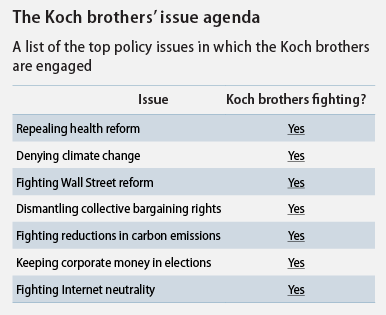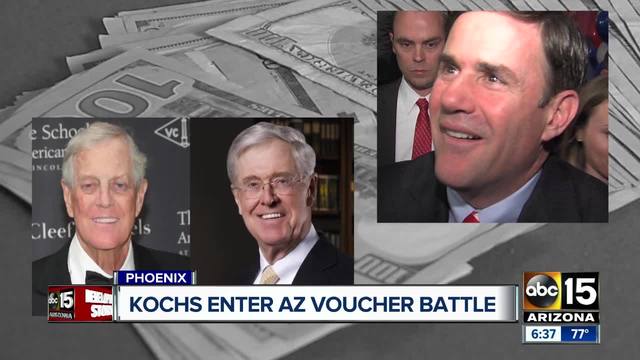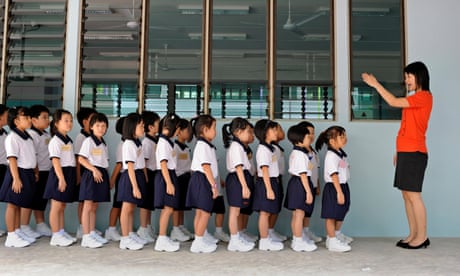EDUCATE YOURSELF ABOUT WHAT THE KOCH BROTHERS ARE DOING TO UNDERMINE DEMOCRACY

The Koch Brothers

Billionaires v teachers: the Koch brothers' plan to starve public education
A small group of women have succeeded in putting a state law promoted by Betsy DeVos and billionaire donors which they see as an attack on public education on the ballot in November
Arizona has become the hotbed for an experiment rightwing activists hope will redefine America’s schools – an experiment that has pitched the conservative billionaires the Koch brothers and Donald Trump’s controversial education secretary, Betsy DeVos, against teachers’ unions, teachers and parents. Neither side is giving up without a fight.
With groups funded by the Koch brothers and DeVos nudging things along, Arizona lawmakers enacted the nation’s broadest school vouchers law, state-funded vouchers that are supposed to give parents more school choice and can be spent on private or religiously affiliated schools. For opponents, the system is not about choice but about further weakening the public school system. A half-dozen women who had battled for months against the legislation were angry as hell.
Convinced that the law would drain money from Arizona’s underfunded public schools, these women complained that Arizona’s lawmakers had ignored the public will and instead heeded the wishes of billionaires seeking to build up private schools at the expense of public schools.
“We walked outside the Capitol Building, and we looked at each other, and said, ‘What now?” said one of the women, Dawn Penich-Thacker, a mother of two boys in public school and a former army public information officer. “We had been fighting this for four months. We realized that there’s something we can do about it. It’s called a citizens’ referendum. We said, ‘Let’s do it.’”
Little did they know the challenges ahead. They would need 75,321 signatures to get their referendum on the ballot to overturn the law. They formed a group, Save Our Schools, and set out to collect the needed signatures. Opposing lobbyists sneered, saying no way could they do that.
The six women inspired a statewide movement and got hundreds of volunteers to brave Arizona’s torrid summer heat to collect signatures – in parks and parking lots, at baseball games and shopping malls. Their message was that billionaire outsiders were endangering public education by getting Arizona’s legislature – in part through campaign contributions – to create an expensive voucher program.
“We knew something was rotten in the state of Arizona,” said Beth Lewis, a fifth-grade teacher who is president of Save Our Schools. “We drew a line in the sand. We said, ‘We’re not going to let this happen.’” Lewis said Arizona’s schools are so underfunded that some classes have 40 students and her school needs to ask a private citizen to donate money when a teacher needs a set of books for her class.“We knew something was rotten in the state of Arizona,” said Beth Lewis, a fifth-grade teacher who is president of Save Our Schools. “We drew a line in the sand. We said, ‘We’re not going to let this happen.’” Lewis said Arizona’s schools are so underfunded that some classes have 40 students and her school needs to ask a private citizen to donate money when a teacher needs a set of books for her class.
Upset that the vouchers law would funnel money toward private schools, Lewis said: “We can’t fund two different school systems. We can hardly afford one.”
Save our Schools submitted 111,540 signatures to the secretary of state in August 2017, but the Koch brothers’ political arm, Americans for Prosperity, sued to block the referendum. A judge dismissed the lawsuit and approved the referendum for 6 November – it’s called Proposition 305. The vote will be closely watched by people on both sides of the debate as the Kochs and DeVos hope to spread the voucher scheme and opponents look to Arizona for clues on how to stop them.
Arizona’s state supreme court declared an earlier voucher law unconstitutional in 2009 because it earmarked state money for private and religious schools. Two years later, the Arizona legislature enacted a variant on vouchers, called Empowerment Scholarship Accounts, that gave prepaid bank cards to parents who transferred their children from public schools to home-schooling or private or religious schools. The cards paid for tuition, tutoring, textbooks and education therapies. That 2011 law limited eligibility to children with disabilities, children of veterans, children on tribal lands and children attending schools that received D or F ratings.
An Arizona appellate court upheld those accounts, known as ESAs, ruling that they did not violate the state constitution because the money went to parents and was not “preordained” for private or religious schools.
But many Arizonans see the ESAs as vouchers in disguise. “It’s money laundering,” said Penich-Thacker, who teaches English at Arizona State University. “Instead of handing those tax dollars to private schools and religious schools, the government loads the money on to a debit card, hands it to individual parents, and however you use this, we’re looking in the other direction.”
In April 2017, with Penich-Thacker, Lewis and many other champions of public schools objecting, the Arizona legislature enacted a law that expands eligibility so that any of the state’s 1.1 million public school students can qualify for an ESA. Some lawmakers feared it would cause a devastating exodus from Arizona’s public schools, so, in a compromise, the legislature capped the number of ESAs at 30,000 students.
Kim Martinez, spokeswoman for the American Federation for Children, a school choice group founded by Betsy DeVos, defended the law. “They’re not vouchers because the money is going to the families,” she said. “We’re trying to make it easier for families who cannot afford school choice to have access to it. What happens if low-income families can’t afford private school, but their child [in public school] is failing or falling through the cracks or being bullied or, for whatever reason, they’re not doing well.”
Martinez said critics are wrong to assert the law’s purpose is to drain funds from – and weaken – public schools. “We’re for higher teacher pay. We’re for proper school funding, and equally important is having whatever option families need, regardless of the income level of the zip code they live in, to get their kids the best education and meet their needs.”
Ramona Carrasco, a supervisor at a cleaning company, said the ESAs have been a blessing, enabling her to send Byanca, her nine-year-old daughter with Down syndrome, to a private school. Byanca had gone to public school for two years, but “it broke my heart when I saw her playing by herself. I couldn’t take it,” Carrasco said. She said Byanca is much happier and learning far more at her new school, Pleasantview Christian elementary school in Phoenix.
“I think all families should have the same choice that Byanca has because we want our kids to succeed,” Carrasco said.
Governor Douglas Ducey is also eager to preserve the ESA law. He told a gathering of Koch donors: “I didn’t run for governor to play small ball. I think this is an important idea.”
The teachers’ union strongly backs Save Our Schools’ effort to overturn the law. “The Koch brothers and DeVos are trying to do everything they can to divert money that should go to the public-school system, where 90%-plus of students go,” said Joe Thomas, president of the Arizona Education Association. Last April, tens of thousands of Arizona teachers went on strike for six days to demand higher pay and school funding. Ducey promised them a 20% raise by 2020, but convinced that he did not put enough money into the budget to finance those raises, the teachers’ union got a second referendum on the ballot that would increase income taxes on richer households to raise over $600m a year for education.
The Arizona Supreme Court threw it off the ballot last Wednesday, with the union calling it a Ducey-backed “low blow” that cheats voters out of the opportunity to increase education funding.
Lily Eskelen Garcia, president of the National Education Association, said what has happened in Arizona is part of a scheme to undermine public education. “We know exactly how the plan goes,” she said. “You underfund the kids who need the most. You starve the public schools. You take away the funding so they can’t deliver quality services, and then when things get so bad that nobody wants to work in the schools, the voucher salesmen, the vultures, swoop in and do this nice little bait and switch. Instead of fixing the schools, they say let’s make sure you have the same program as wealthy kids at private schools.” But vouchers, she said, don’t begin to deliver on that promise.
Americans for Prosperity argues that the Arizona law isn’t draining money from public schools. Its officials note that the average ESA is about $4,500 – roughly the tuition at many private schools in Arizona – leaving public schools with extra money because the $4,500 is thousands of dollars less than the average those schools spend per student.
The Koch-funded Americans for Prosperity and the DeVos-backed American Federation of Children have pushed for vouchers in many states. They helped get an Arizona-like education savings account law passed in Nevada in 2015, but that state’s supreme court ruled it unconstitutional. In 2007, Utah voters voted 62% to 38% to repeal a vouchers law.
Victor Riches, president of the Goldwater Institute, a conservative thinktank in Phoenix, denied that ESAs were foisted on Arizona by outside billionaires. “School choice is an issue that we’ve been extremely supportive of – we started working on it many years ago,” Riches said. “It’s important that parents have as many educational options as possible so they can create the best possible education for their children.”
Save Our Schools notes, with dismay, that the Goldwater Institute has said it hopes to eliminate the 30,000 cap and greatly expand the ESA law. That fear has fueled the repeal effort.
“We set out to do something that everybody said is impossible,” Lewis said. “The women on our team are very tenacious.”
Since you’re here…
… we have a small favour to ask. More people are reading the Guardian than ever but advertising revenues across the media are falling fast. And unlike many news organisations, we haven’t put up a paywall – we want to keep our journalism as open as we can. So you can see why we need to ask for your help. The Guardian’s independent, investigative journalism takes a lot of time, money and hard work to produce. But we do it because we believe our perspective matters – because it might well be your perspective, too.
The Guardian is editorially independent, meaning we set our own agenda. Our journalism is free from commercial bias and not influenced by billionaire owners, politicians or shareholders. No one edits our Editor. No one steers our opinion. This is important because it enables us to give a voice to the voiceless, challenge the powerful and hold them to account. It’s what makes us different to so many others in the media, at a time when factual, honest reporting is critical.
If everyone who reads our reporting, who likes it, helps to support it, our future would be much more secure. For as little as $1, you can support the Guardian – and it only takes a minute. Thank you

Comments
Post a Comment